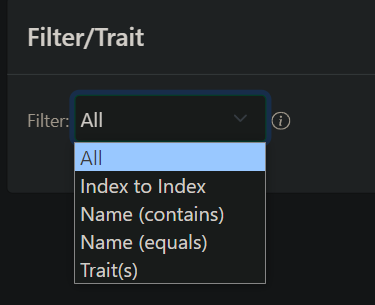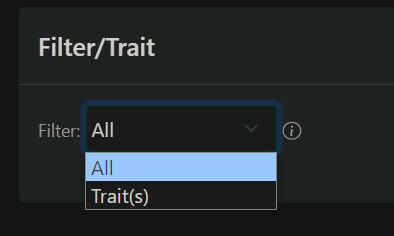Traits/Filters
There are six filter options for Mass Offer
All:
All NFTs in the given collection
Index to Index:
NFTs from an index to another index. Example for this could be this Reddit Collection, NFTs from the index 2250 to 2349 are a specific trait. You can check an index of an NFT by looking at their link, the end part after the last "/" is their index. Example: This NFT's index is 7930. (Check notes below)
Name (contains):
Every NFT in the collection that contains the given text in their name. (Check notes below)
Name (equals):
Every NFT in the collection that is the given name. Keep in mind that, if the NFT has its index number (ex. #1234) at the end of it, you will also need to put that in the name input, or please use Name (contains) for all NFTs that has the name in it. (Check notes below)
Custom ID list:
Simply choose Trait(s) and then use this format to bid using a custom ID list:
NftId: 1-5-10-100-1000-9999Note: When there are multiple custom ID list tasks with same collections (and durations), they will be grouped together at the initial/active loop in order to make it a lot more efficient and faster for their loop to complete. Instead of looping the same collection once per each task, it will loop it once for that group of tasks.
Trait(s):
Traits are case-sensitive. Check below notes to see how to set the correct upper/lower cases.
Trait selection text layout:
For a single trait:
[Trait title]: [Trait name]
For NFTs that has two (or more) traits: (the "And" operator)
[Trait title]: [Trait name], [Trait title]: [Trait name]
For two (or more) different traits: (the "Or" operator, learn more about how this works from here)
[Trait title]: [Trait name]
[Trait title]: [Trait name]
Some things to keep in mind:
Make sure you have no additional spaces or lines
Trait types (or trait titles) and values (or trait names) are case sensitive.
You can combine the above layouts (as seen as the below example)
Make sure to understand how this works before sending high value offers
Example trait selection text input (with explanations):
Type: Zombie, Hat: Golden (all NFTs that has both zombie as its type and golden as its hat) Type: Alien (plus, all NFTs that has alien as its type) Type: Human, Shoes: diamond shoes (plus, all NFTs that has both human as its type and diamond shoes as its shoes)

There are two filter options for Collection Offer:
All:
A standard collection offer
Trait(s):
Traits are case-sensitive. Check below notes to see how to set the correct upper/lower cases. This follows the same format as the Mass Offer's trait(s) selection. Only difference is, only one trait can be set for collection offers. (So no "And" operator, but "Or" will still work. Learn more about how "Or" works from here.)
Also, the collection must have trait collection offers enabled for this to work. You can check if it is enabled or not by going to its OpenSea page and clicking collection offer, if you can select traits there, then you can also use the trait selection here.

Notes on filter options
Options Index, Name (contains/equals), and custom ID list may be slow at the initial and active loop. This is caused by the live index needing to loop the whole collection in order to get the NFTs with the given filter. So, bigger the collection, slower the initial loop for that task. Usually a collection with 10 000 NFTs with these filters would take around a minute or so for it to finish the initial bidding, after initial bidding, counter bids will not be slow like the loops
To learn more about how "Or" operator works, head out to here
How to get the correct upper/lower cases of traits:
You can use OpenSea 2: Traits on OpenSea 2 show the correct upper/lower cases, you can either just select a trait and see or just use the panel on the left


Last updated